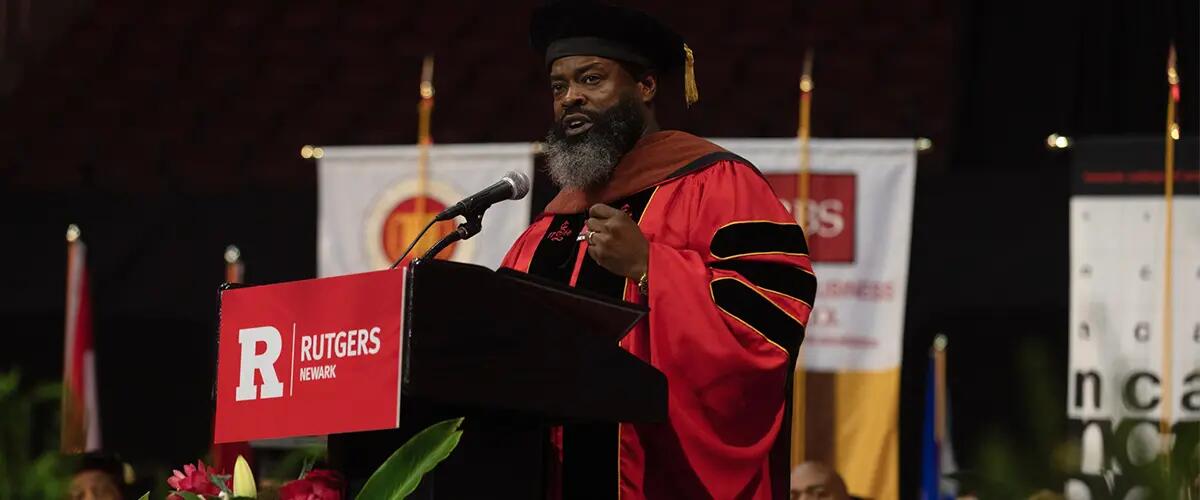
Tariq Trotter, aka Black Thought of The Roots, delivers his speech at Rutgers-Newark's commencement ceremony. PHOTO CREDIT: Maxim Ryazansky
Rapper and Creator Black Thought of The Roots Urges Rutgers-Newark Graduates to Become ‘Myth Makers’
Rapper and multi-faceted creator Tariq Trotter, also known as Black Thought, co-founder of The Roots, urged Rutgers-Newark graduates to forge new myths and meaning out of a “collapsing old world” at the school’s commencement ceremony.
In a speech that cited sources as wide-ranging as Joseph Campbell’s "The Power of Myth" and the Declaration of Independence, Trotter encouraged the Class of 2024 to embark upon a journey of creation and self-invention.
"The collapse of the old world requires a new myth to be born that connects us all … You write it, discover it, calculate it, draw it, create it … You are the mythmakers," said Trotter, known by many as the frontman of the legendary hip-hop group The Roots. For more than a decade, they have been the house band on "The Tonight Show Starring Jimmy Fallon."
The ceremony, held at the Prudential Center in Newark, celebrated a total of 3017 undergraduate and graduate degree recipients, including approximately 685 undergraduates from Rutgers Business School-Newark.
Trotter, who was awarded an Honorary Doctor of Fine Arts, was introduced by Pulitzer Prize-winner Salamishah Tillet, a professor of Africana Studies and Creative Writing. She described his reputation as one of the greatest rappers of all time, a "surgeon of emceeing," who overcame a traumatic childhood to succeed in multiple mediums as an actor, filmmaker, producer and memoirist.
"Art saved his life, and his art changed ours," said Tillet, who is executive director of Express Newark.
Trotter and other speakers reminded graduates that they began and ended their college years during times of great upheaval, starting in the midst of a pandemic — when they learned remotely — and finishing amid global violence and political divisiveness.
He invited the crowd to acknowledge their arrival at the ceremony by saying the words, "I am here."
"Let’s all declare it to the universe," he exhorted.
Trotter told graduates that commencement marks one milestone in a continuous process of transformation.
"What are we doing here today? We receive a piece of paper that basically says … I am a graduate in this field of study. I became a different person than I started out as. I made it through every single piece of chaos that the experience tried to throw at me. That’s a hell of an accomplishment. That’s a hell of a self-myth. While this struggle is still fresh in your mind, you’ll feel like nothing is impossible, and it isn’t. You are the mythmakers, you are the griots. You are the authors."
Rutgers-Newark Chancellor Nancy Cantor extolled the power of empathy — and diverse experiences— especially during times of conflict.
“Empathy for what others need is key — to acknowledge the possibility that their personas and histories and roads traveled, and even their pain, are just as real as our own. It is what we want for ourselves, and so it must be what we give to others," Cantor said.
"We don’t need to see the world the same way," she said. "Embedded in our complex personal identities are the connections to many different homelands and histories that emerge especially prominent in our minds and hearts as we witness conflicts and displacements around the globe. Those identities, those connections, those heartfelt responses are real … and we should never be asked to hide them."
Newark Mayor Ras Baraka praised the graduates’ diversity as reflective of the nation and its possibilities. "As everything is in chaos around the world, it’s always great to be here looking at how beautiful and amazing America really looks," he said.
He urged graduates to work toward a better nation for everyone. "I need you to walk out of this university with your best self and best mind and begin to fight for freedom, equity and justice for all Americans," he said. "Fight for democracy, because you see democracy at work here at Rutgers-Newark."
Student speakers recounted their own paths to commencement and dispensed advice.
Undergraduate speaker Ghufran Hussain, a Biology major, described her family’s emigration from Iraq and the community she found at Rutgers-Newark.
"My parents made the sacrifice of leaving everything behind, and they instilled in me a spirit of resilience," she said. "It is the collective strength of our class that has encouraged our resilience to blossom here."
Graduate student speaker Malayja Brown, who earned a master's degree from the School of Criminal Justice, quoted Winston Churchill. "Success if not final. Failure is not fatal. It’s the courage to continue that counts," she said.
This story was written by Carrie Stetler, Office of Communications, Rutgers University-Newark.
Press: For all media inquiries see our Media Kit


